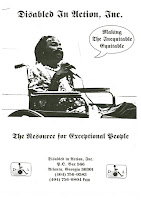Since 2013 the Russell Library has been a partner in the Georgia Disability History Alliance, a group of activists, advocates organizational leaders, archivists, and others united to document and preserve the state’s disability history. Over the past year, through partial support from UGA’s Center for Social Justice, Human & Civil Rights, Russell Library staff has completed processing over a dozen collections that form part of the Georgia Disability History Archive. These newly available collections document individuals and organizations in the areas of disability rights and activism, developmental disabilities, mental health advocacy, public policy and law, independent living and support programs, and assistive technology. To explore these topics and more, see the collection descriptions below and follow the links for complete guides to these collections.
The Archive as a whole seeks to document the vital and transformative work undertaken by disability activists, advocates, and organizations and, crucially, the experiences of persons with disabilities over the past 100 years in the state of Georgia. Major collecting areas include, but are not limited to: accessibility, activism and social justice, citizen advocacy, independent and community living, self-advocacy, education, employment, culture and pride. These collections will support research, teaching, public programming, and exhibitions. For more information about the Archive, please contact Mat Darby at matdarby@uga.edu or 706-542-0627.
Dottie Adams Papers, 1968-2007
Dottie Adams is the former Individual and Family Supports Director for the Georgia Council on Developmental Disabilities. Her papers document her prolific career in advocacy and disability activism (1968-2009) and includes materials from her work with state agencies and commissions, support organizations, and philanthropic and activist work in the state of Georgia.
ADA Training Materials Collection, 1990-2004
The ADA Training Materials Collection includes curricula created by the Disability Rights Education and Defense Fund (DREDF) for states and organizations to use in implementing ADA education and training.
Annette Bowling Papers, 1996-2013
Annette Bowling (1936-2016) served as the executive director of the Albany Advocacy Resource Center for over forty years. Her papers include materials related to her work advocating for people with disabilities, notably her service as chair of the Commissioner’s Oversight Committee, which oversaw the closures of the Brook Run Center in 1997 and the Georgia Mental Health Institute (GMHI) in 1998.
Disability Law and Policy Center of Georgia Records, 2000-2011
The Disability Law and Policy Center of Georgia is an organization that addresses the legal rights of the disabled in individual cases, employment, and education. The records include documentation of the Center's policies and priorities, grant-funded activities, and employee engagement.
Beth English Collection of Disability History Materials, 1968-2012
Beth English is the executive director of Easter Seals Southern Georgia. Her collection documents her work on the Commissioner’s Oversight Committee, which oversaw the closure of the Brook Run Center in 1997, her work as executive director of Easter Seals Southern Georgia, advocacy initiatives, and Central State Hospital, in Milledgeville, Georgia.
Roderick L. (RL) Grubbs Papers, 1973-2014
Roderick L. (RL) Grubbs (1959-2016) was an advocate for assistive technology, a disability rights activist, and a specialist in the Georgia Department of Community Health. His papers include subject files on a variety of disability-related topics and organizations and material related to Money Follows the Person, a state program.
Mark Johnson Papers, 1965-2015
Mark Johnson is the Director of Advocacy at the Shepherd Center in Atlanta. He holds a Master’s degree in Guidance and Counseling and has been an advocate and leader in the disability rights movement for over thirty years. His papers contain subject and chronological files, artifacts, t-shirts, and audiovisual materials related to his work as a disability advocate, organizer, and professional.
Carol Jones Papers, 1987-2011
Carol Jones is an advocacy specialist at the Shepherd Center in Atlanta and a long-time participant in the disability rights movement. Her papers include documents and memorabilia related to many advocacy issues and organizations, including ADAPT and the Long Road Home March and Rally.
Mary Kissel Papers, 1990-2007
Mary Kissel is a founder and interim executive director of Georgia Options. Her papers document her advocacy for person-centered care for individuals with developmental disabilities and her work with Georgia Options and other advocacy organizations.
Beverly Benson Long Papers, 1940-2009
Beverly Benson Long (1920-2015) served in state, national and international organizations as a mental health professional and advocate. Her papers document her extensive work and career in the mental health field and include correspondence, internal reports, papers, newsletters, memos, conference proceedings, and commission and board meeting materials.
Reverend Calvin Peterson and Disabled in Action Atlanta Collection, 1967-2015
Reverend Calvin Peterson is the founder and director of Disabled in Action, a non-profit organization with a mission to advocate, educate and empower people with disabilities living in poverty, their families and caregivers, and with an emphasis on equity and inclusion. The collection includes articles of incorporation, correspondence, press releases, news clippings, brochures, flyers, photographs, DVDs, and other materials that document Rev. Peterson and Disabled in Action's advocacy and activism.
Don Schanche, Jr. Papers, 1986-2004
Don Schanche, Jr. is a journalist who has written for many Georgia newspapers. His papers document his investigative work on state hospitals and his coverage of disability issues throughout the state.
Southeast ADA Center Resource Collection, 1990-2010
The Southeast ADA Center provides information, training, and guidance on the Americans with Disabilities Act and disability access for business, government, and individuals at the local, state, and regional levels. The collection includes materials created and distributed by the center for education, instruction and compliance with the ADA.
Mary M. Wood Papers, 1972-2011
Mary M. Wood is an educator, researcher and founder of the Developmental Therapy Institute, which focuses on training, research, development and outreach in Developmental Therapy-Teaching (DTT). Her papers document her work to improve the lives of troubled children, teens, and their families through effective interventions and includes publications, research and grant files.
 |
| Excerpt from ADAPT activist Mark Johnson's testimony before the U.S. Senate on the Americans with Disabilities Act, 1989. Carol Jones Papers |
Dottie Adams Papers, 1968-2007
Dottie Adams is the former Individual and Family Supports Director for the Georgia Council on Developmental Disabilities. Her papers document her prolific career in advocacy and disability activism (1968-2009) and includes materials from her work with state agencies and commissions, support organizations, and philanthropic and activist work in the state of Georgia.
ADA Training Materials Collection, 1990-2004
The ADA Training Materials Collection includes curricula created by the Disability Rights Education and Defense Fund (DREDF) for states and organizations to use in implementing ADA education and training.
Annette Bowling Papers, 1996-2013
Annette Bowling (1936-2016) served as the executive director of the Albany Advocacy Resource Center for over forty years. Her papers include materials related to her work advocating for people with disabilities, notably her service as chair of the Commissioner’s Oversight Committee, which oversaw the closures of the Brook Run Center in 1997 and the Georgia Mental Health Institute (GMHI) in 1998.
Disability Law and Policy Center of Georgia Records, 2000-2011
The Disability Law and Policy Center of Georgia is an organization that addresses the legal rights of the disabled in individual cases, employment, and education. The records include documentation of the Center's policies and priorities, grant-funded activities, and employee engagement.
Beth English Collection of Disability History Materials, 1968-2012
Beth English is the executive director of Easter Seals Southern Georgia. Her collection documents her work on the Commissioner’s Oversight Committee, which oversaw the closure of the Brook Run Center in 1997, her work as executive director of Easter Seals Southern Georgia, advocacy initiatives, and Central State Hospital, in Milledgeville, Georgia.
Roderick L. (RL) Grubbs Papers, 1973-2014
Roderick L. (RL) Grubbs (1959-2016) was an advocate for assistive technology, a disability rights activist, and a specialist in the Georgia Department of Community Health. His papers include subject files on a variety of disability-related topics and organizations and material related to Money Follows the Person, a state program.
Mark Johnson Papers, 1965-2015
Mark Johnson is the Director of Advocacy at the Shepherd Center in Atlanta. He holds a Master’s degree in Guidance and Counseling and has been an advocate and leader in the disability rights movement for over thirty years. His papers contain subject and chronological files, artifacts, t-shirts, and audiovisual materials related to his work as a disability advocate, organizer, and professional.
Carol Jones Papers, 1987-2011
Carol Jones is an advocacy specialist at the Shepherd Center in Atlanta and a long-time participant in the disability rights movement. Her papers include documents and memorabilia related to many advocacy issues and organizations, including ADAPT and the Long Road Home March and Rally.
Mary Kissel Papers, 1990-2007
Mary Kissel is a founder and interim executive director of Georgia Options. Her papers document her advocacy for person-centered care for individuals with developmental disabilities and her work with Georgia Options and other advocacy organizations.
 |
| The Bell Ringer, a publication of the Metropolitan Atlanta Mental Health Association, February 1962. Beverly Benson Long Papers |
Beverly Benson Long Papers, 1940-2009
Beverly Benson Long (1920-2015) served in state, national and international organizations as a mental health professional and advocate. Her papers document her extensive work and career in the mental health field and include correspondence, internal reports, papers, newsletters, memos, conference proceedings, and commission and board meeting materials.
Reverend Calvin Peterson and Disabled in Action Atlanta Collection, 1967-2015
Reverend Calvin Peterson is the founder and director of Disabled in Action, a non-profit organization with a mission to advocate, educate and empower people with disabilities living in poverty, their families and caregivers, and with an emphasis on equity and inclusion. The collection includes articles of incorporation, correspondence, press releases, news clippings, brochures, flyers, photographs, DVDs, and other materials that document Rev. Peterson and Disabled in Action's advocacy and activism.
Don Schanche, Jr. Papers, 1986-2004
 |
| Flyer for the organization, Disabled in Action, circa 1990. Reverend Calvin Peterson and Disabled in Atlanta Collection. |
Southeast ADA Center Resource Collection, 1990-2010
The Southeast ADA Center provides information, training, and guidance on the Americans with Disabilities Act and disability access for business, government, and individuals at the local, state, and regional levels. The collection includes materials created and distributed by the center for education, instruction and compliance with the ADA.
 |
| A publication of the Georgia Psychoeducational Center Network, 1973. Mary M. Woods Papers |
Mary M. Wood is an educator, researcher and founder of the Developmental Therapy Institute, which focuses on training, research, development and outreach in Developmental Therapy-Teaching (DTT). Her papers document her work to improve the lives of troubled children, teens, and their families through effective interventions and includes publications, research and grant files.








































